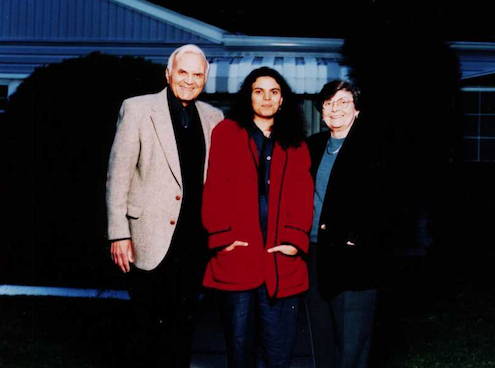Blue Vinyl

Full Description
Activist filmmaker Judith Helfand, who explored the devastating effects of DES on her own body in A HEALTHY BABY GIRL (SFJFF 1997), is not one to look the other way when a potential toxin gets too close to home. So when her Jewish parents affix vinyl siding to their suburban Long Island abode, she gets suspicious. Armed with a big blue slab from a home improvement project, Helfand marches straight to the centers of vinyl production to get the skinny on the seemingly harmless plastics, used to make not only cheap, durable siding but also flooring, toys, credit cards, IV bags, you name it. Taking a personal comedic approach, directors Helfand and Gold brilliantly link unlikely stories and characters across continents, race, and class to uncover the impact of vinyl manufacturing and disposal on the atmosphere, the food chain, and humans. It is not a pretty picture. You will never look at plastic the same way again.
BLUE VINYL will ask Jewish audiences to reframe and rethink the tenet “l'dor v'dor,” from one generation to the next, as the literal and unwitting passing onto our children of a dangerous and persistent toxic chemical burden. An accessible, haimish, entertaining, and intergenerational call to action.
Caroline Libresco
Sundance Film Festival, 2002
Director Judith Helfand in person
Don’t miss Judith Helfand: In Conversation on
Saturday August 1, 2:10PM at the California Theatre
in Berkeley.
Filmmaker Bio(s)
Daniel B. Gold has lived in New York City for the past 10 years, and BLUE VINYL marks his feature documentary debut. His 1985 film, SKIN ON SKIN, won an award for one of the best NYU documentaries of the year. Gold went on to produce, direct, and edit several short films and won two Cine Golden Eagle Awards., Judith Helfand is an independent film and video maker based in New York. She co-produced and co-directed with George Stoney The Uprising of '34, an award- winning documentary that draws on the hidden history of the General Textile Strike of 1934 to explore labor, power and economics in the South today. With this film, Helfand developed a series of "Using History as an Organizing Tool" workshops, which evolved into the nationwide "Labor to Neighbor" campaign at the time of the film's broadcast on the PBS series P.O.V. in June of 1995.
She worked as an associate producer on two other PBS documentaries: Broken Minds, a Frontline episode directed by DeWitt Sage on the treatment and mistreatment of schizophrenia and the homeless mentally ill, and Through the Wire, Nina Rosenblum's film about an experimental maximum security unit for women political prisoners in the U.S., which was aired on P.O.V. She is a graduate of New York University's Tisch School of the Arts, Undergraduate Film and Television Program.
Prior to focusing on documentaries, Helfand worked for three years at the YIVO Institute for Jewish Research as a production associate on the archival photo video-disk People of a Thousand Towns: A Visual Encyclopedia of Jewish Eastern Europe 1865-1939.
She has run video and media literacy workshops with textile workers, community organizers in the South and designed a video production program for homeless mentally ill adults in New York City. Over the past year she has been working in collaboration with social studies teachers on an interactive curriculum using The Uprising of '34 to "Link the Classroom to the Community."
FESTIVALS & AWARDS
1997 Sundance Film Festival, Documentary competition
June 1997, broadcast nationally the PBS series P.O.V.
1997 San Francisco Jewish Film festival
Director(s)
Country(ies)
Release Year
Festival Year(s)
Running Time
98
